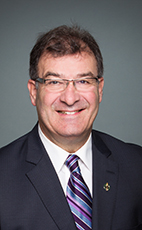moved that the bill be read the third time and passed.
Mr. Speaker, many Canadians will remember the summer of 1990. Oka acted as a national wake-up call. It sent a clear signal that as a country we had to take concrete action to ensure that the concerns of people like the Mohawks of Kanesatake were not only heard but acted upon.
This is precisely what the Government of Canada and the Mohawks of Kanesatake have been doing ever since the barricades came down.
For example, talks are currently underway between current grand chief James Gabriel, his council, the mayor of Oka and his municipal council to negotiate a harmonization of Kanesatake laws and Oka bylaws on neighbouring lands in the village of Oka as required by Bill S-24.
With incremental steps, we have proven that together the path of negotiation and reconciliation is the best option for all parties involved. Bill S-24 would raise the bar another notch and would continue our work to resolve the outstanding issues confronting the Mohawk people of Kanesatake.
Bill S-24, and the agreement it would implement, would formally recognize an interim land base for the Mohawks of Kanesatake. It would not be a permanent land base because the agreement in no way represents a final resolution of land issues for Kanesatake. It is entirely possible that additional lands may in the future be brought under the agreement should both parties agree.
While the agreement is limited in its scope, it nevertheless represents a major breakthrough. Kanesatake Mohawk lands would now fall under section 91(24) of the Constitution Act, 1867. It is something the Mohawks of Kanesatake have sought for many years. The legislation would prevent the lands from falling under the Indian Act, something they are determined to avoid. They fully realize that other first nations are trying to extricate themselves from the cumbersome provisions of the act.
It was for this very reason that I recently launched national consultations on first nations governance. Although Bill S-24 was developed before consultations on governance reform got underway, it is entirely consistent with the thrust of our initiative.
These measures set the stage for further negotiations on a range of substantive issues. They are the first crucial step in the ongoing process of ensuring peace and prosperity for the community. In the end that is our overarching objective no matter which side of the negotiating table we sit on.
The legislation sets out a framework by which the two communities would be able to peacefully co-exist, paving the way for economic and social development and an improved quality of life for all the people living in and around the area.
The legislation is a tremendous accomplishment and a tribute to the hard work and tenacity of all parties involved, most particularly, the Mohawks of Kanesatake. The future is as bright and promising as the young democracy that has taken hold in Kanesatake since the barricades came down and that we as legislators are helping to shape. This achievement should be celebrated not just in the halls of parliament but across the country.
I would like to thank our colleagues in the Senate for their part in the review and adoption of Bill S-24. I urge all hon. members to follow the example of the Mohawk people of Kanesatake who acted in good faith to achieve this landmark agreement by voting to adopt the historic legislation.

